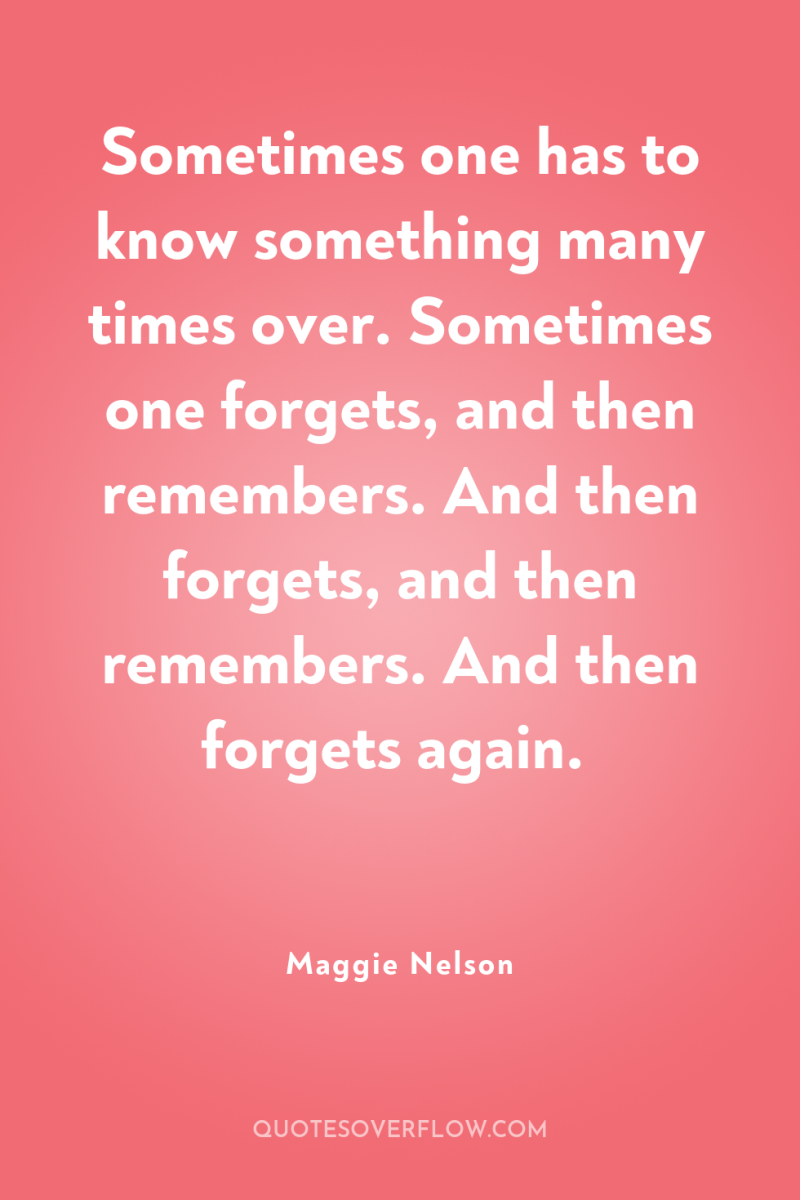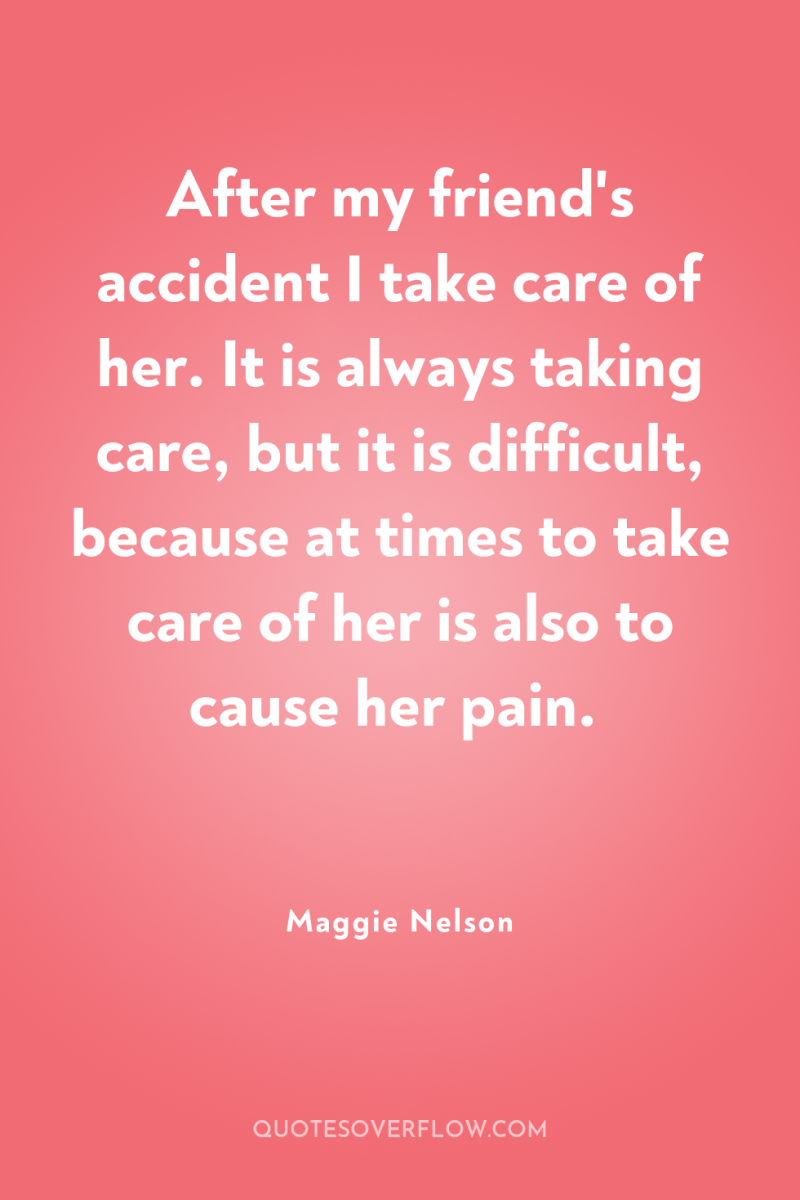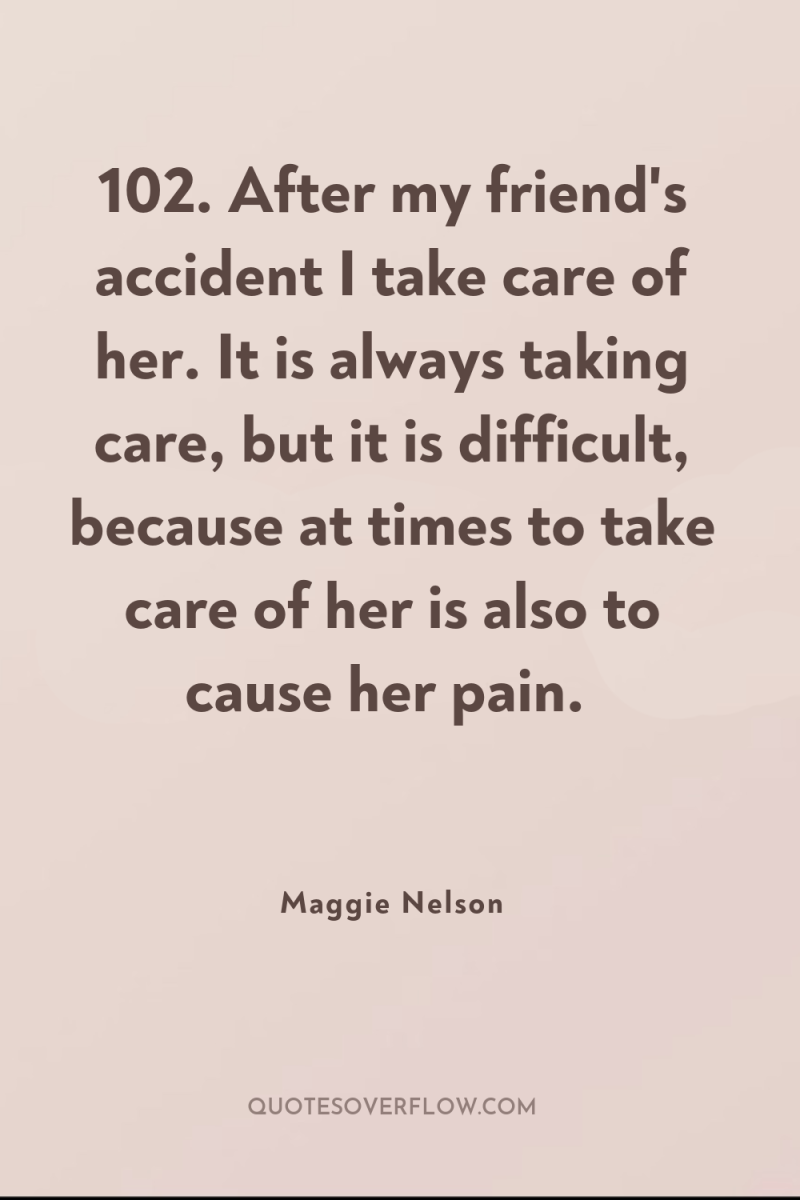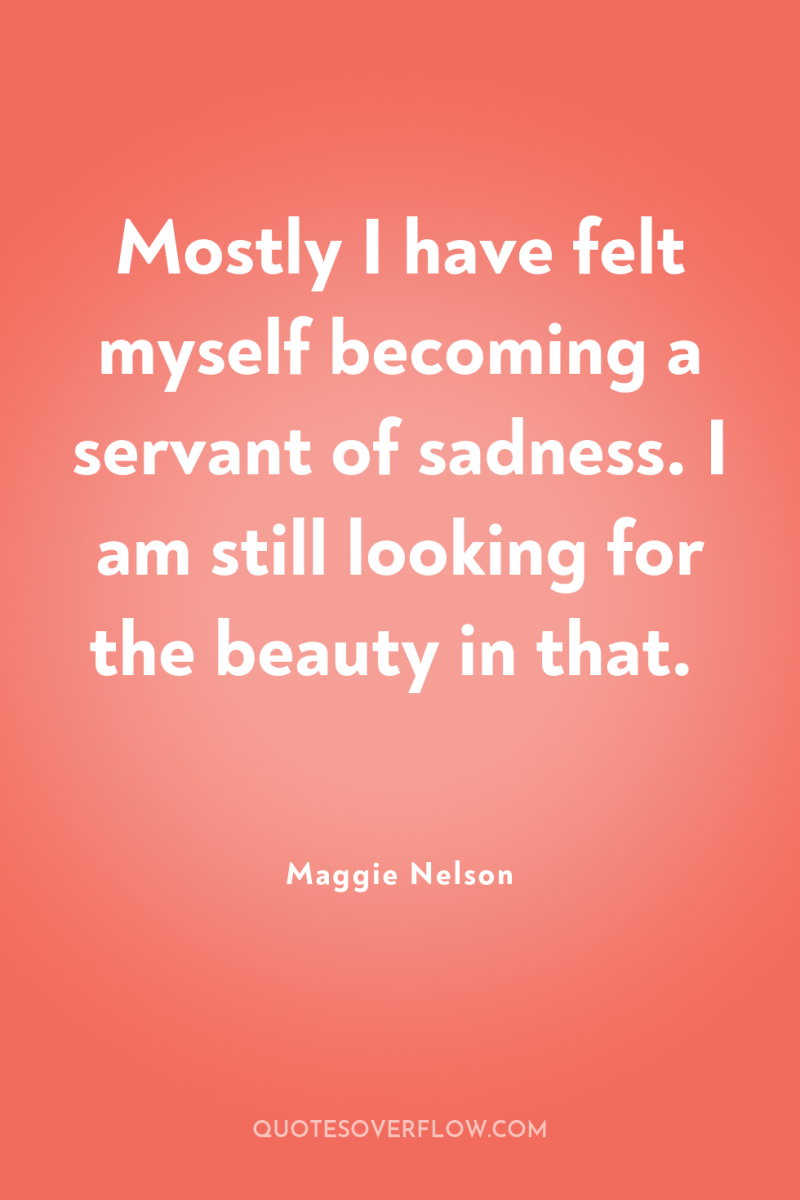
1
Sometimes one has to know something many times over. Sometimes one forgets, and then remembers. And then forgets, and then remembers. And then forgets again.Maggie Nelson
2
I felt the wild need for any or all of these people that night. Lying there alone, I began to feel - perhaps even to know - that I did not exist apart from their love and need of me. Of this latter I felt less sure, but it seemed possible, if the equation worked both ways. Falling asleep I thought, 'Maybe this, for me, is the hand of God.Maggie Nelson

3
After my friend's accident I take care of her. It is always taking care, but it is difficult, because at times to take care of her is also to cause her pain.Maggie Nelson

4
102. After my friend's accident I take care of her. It is always taking care, but it is difficult, because at times to take care of her is also to cause her pain.Maggie Nelson
5
I remember, around age ten, beholding the scene in The Shining in which the hot young woman whom Jack Nicholson is lewdly embracing in the haunted hotel bathroom ages rapidly in his arms, screeching from nubile chick to putrefying corpse within seconds. I understood that the scene was supposed to represent some kind of primal horror. This was The Shining, after all. But the image of that decaying, cackling crone, her arms outstretched in desire toward the man who is backing away, has stayed with me for three decades, as a type of friend. She’s part baths-ghost, part mad- Naomi. She didn’t get the memo about being beyond wanting or being wanted. Or perhaps she just means to scare the shit out of him, which she does. .Maggie Nelson
6
You’re looking for sexual tidbits as a female child, and the only ones that present themselves depict child rape or other violations (all my favorite books in my preteen years: I Know Why the Caged Bird Sings, Clan of the Cave Bear, The World According to Garp, as well as the few R-rated movies I was allowed to see– Fame, most notably, with its indelible scene of Irene Cara being asked to take her shirt off and suck her thumb by a skeezy photographer who promises to make her a star), then your sexuality will form around that fact. There is no control group. I don’t even want to talk about “female sexuality” until there is a control group. And there never will be. .Maggie Nelson

7
Mostly I have felt myself becoming a servant of sadness. I am still looking for the beauty in that.Maggie Nelson

8
It will not say, 'Isn't X beautiful?' Such demands are murderous to beauty.Maggie Nelson
9
For blue has no mind. It is not wise, nor does it promise any wisdom. It is beautiful, and despite what the poets and philosophers and theologians have said, I think beauty neither obscures truth nor reveals it. Likewise, it leads neither towards justice nor away from it. It is pharmakon. It radiates.Maggie Nelson
10
It is always taking care, but it is difficult, because at times to take care of her is also to cause her pain.Maggie Nelson
11
This is generous, for to be close to her pain has always felt like a privilege to me, even though pain could be defined as that which we typically aim to avoid.Maggie Nelson
12
[A]fter all, what does it mean for pain to be 'memorable'? You're either in pain or you're not. And it isn't the pain that one forgets. It's the touching death part. As the baby might say to its mother, we might say to death: I forget you, but you remember me.Maggie Nelson
13
We’re only given as much as the heart can endure, ” “What does not kill you makes you stronger, ” “Our sorrows provide us with the lessons we most need to learn”: these are the kinds of phrases that enrage my injured friend. Indeed, one would be hard-pressed to come up with a spiritual lesson that demands becoming a quadriparalytic. The tepid “there must be a reason for it” notion sometimes floated by religious or quasi-religious acquaintances or bystanders, is, to her, another form of violence. She has no time for it. She is too busy asking, in this changed form, what makes a livable life, and how she can live it.Maggie Nelson
14
Some of the subjects of Puppies and Babies may not identify as queer, but it doesn’t matter: the installation queers them. By which I mean to say that it partakes in a long history of queers constructing their own families–be they composed of peers or mentors or lovers or ex-lovers or children or non-human animals–and that it presents queer family making as an umbrella category under which baby making might be a subset, rather than the other way around. It reminds us that any bodily experience can be made new and strange, that nothing we do in this life need have a lid crammed on it, that no one set of practices or relations has the monopoly on the so-called radical, or the so-called normative.Maggie Nelson
15
Misogyny, when expressed or explored by men, remains a timeless classic.Maggie Nelson
16
One thing they don’t tell you ’bout the blues when you got ’em, you keep on fallin’ ’cause there ain't no bottom, ' sings Emmylou Harris, and she may be right. Perhaps it would help to be told that there is no bottom, save, as they say, wherever and whenever you stop digging. You have to stand there, spade in hand, cold whiskey sweat beaded on your brow, eyes misshapen and wild, some sorry-ass grave digger grown bone-tired of the trade. You have to stand there in the dirty rut you dug, alone in the darkness, in all its pulsing quiet, surrounded by the scandal of corpses. .Maggie Nelson
17
Like many self-help books, The Deepest Blue is full of horrifyingly simplistic language and some admittedly good advice. Somehow the women in the book learn to say: That’s my depression talking. It’s not “me.”As if we could scrape the color off the iris and still see.Maggie Nelson
18
I want you to know, if you ever read this, there was a time when I would rather have had you by my side than any one of these words; I would rather have had you by my side than all the blue in the world. But now you are talking as if love were a consolation. Simone Weil warned otherwise. 'Love is not consolation, ' she wrote. 'It is light.' All right then, let me try to rephrase. When I was alive, I aimed to be a student not of longing but of light.Maggie Nelson
19
238. I want you to know, if you ever read this, there was a time when I would rather have had you by my side than any one of these words; I would rather have had you by my side than all the blue in the world.239. But now you are talking as if love were a consolation. Simone Weil warned otherwise. “Love is not consolation, ” she wrote. “It is light.”240. All right then, let me try to rephrase. When I was alive, I aimed to be a student not of longing but of light.Maggie Nelson
20
Eventually I confess to a friend some details about my weeping–its intensity, its frequency. She says (kindly) that she thinks we sometimes weep in front of a mirror not to inflame self-pity, but because we want to feel witnessed in our despair.Maggie Nelson
21
92. Eventually I confess to a friend some details about my weeping–its intensity, its frequency. She says (kindly) that she thinks we sometimes weep in front of a mirror not to inflame self-pity, but because we want to feel witnessed in our despair.Maggie Nelson
22
The question up for debate between Socrates and Phaedrus is whether the written word kills memory or aids it--whether it cripples the mind's power, or whether it cures it of its forgetfulness.Maggie Nelson
23
For the fact is that neuroscientists who study memory remain unclear on the question of whether each time we remember something we are accessing a stable “memory fragment”–often called a “trace” or an “engram”–or whether each time we remember something we are literally creating a new “trace” to house the thought. And since no one has yet been able to discern the material of these traces, nor to locate them in the brain, how one thinks of them remains mostly a matter of metaphor: they could be “scribbles, ” “holograms, ” or “imprints”; they could live in “spirals, ” “rooms, ” or “storage units.” Personally, when I imagine my mind in the act of remembering, I see Mickey Mouse in Fantasia, roving about in a milky, navy-blue galaxy shot through with twinkling cartoon stars.Maggie Nelson
24
It is easier, of course, to find dignity in one's solitude. Loneliness is solitude with a problem. Can blue solve the problem, or can it at least keep me company within it?– No, not exactly. It cannot love me that way; it has no arms. But sometimes I do feel its presence to be a sort of wink– Here you are again, it says, and so am I.Maggie Nelson
25
72. It is easier, of course, to find dignity in one's solitude. Loneliness is solitude with a problem. Can blue solve the problem, or can it at least keep me company within it?– No, not exactly. It cannot love me that way; it has no arms. But sometimes I do feel its presence to be a sort of wink– Here you are again, it says, and so am I.Maggie Nelson
26
I am trying to talk about what blue means, or what it means to me, apart from meaning.Maggie Nelson
27
Do not, however, make the mistake of thinking that all desire is yearning.Maggie Nelson
28
But this time, so far as I can tell, my mother has not made her husband her desire incarnate, though she does love him very much. And for his part, so far as I can tell, he doesn’t try to talk her out of her self-deprecation, nor does he abet it. He simply loves her. I am learning from him.Maggie Nelson
29
Words change depending on who speaks them; there is no cure. The answer isn't just to introduce new words (boi, cis-gendered, andro-fag) and then set out to reify their meanings (though obviously there is power and pragmatism here). One must also become alert to the multitude of possible uses, possible contexts, the wings with which each word can fly. Like when you whisper, You're just a hold, letting me fill you up. Like when I say husband.Maggie Nelson
30
This is the dysfunction talking. This is the disease talking. This is how much I miss you talking. This is the deepest blue, talking, talking, always talking to you.Maggie Nelson
31
Evolution strikes me as infinitely more spiritually profound than Genesis.Maggie Nelson
32
We don't get to choose what or whom we love, I want to say. We just don't get to choose.Maggie Nelson
33
Trans” may work well enough as shorthand, but the quickly developing mainstream narrative it evokes (“born in the wrong body, ” necessitating an orthopedic pilgrimage between two fixed destinations) is useless for some–but partially, or even profoundly, useful for others? That for some, “transitioning” may mean leaving one gender entirely behind, while for others–like Harry, who is happy to identify as a butch on T–it doesn’t? I’m not on my way anywhere, Harry sometimes tells inquirers. How to explain, in a culture frantic for resolution, that sometimes the shit stays messy? I do not want the female gender that has been assigned to me at birth. Neither do I want the male gender that transsexual medicine can furnish and that the state will award me if I behave in the right way. I don’t want any of it. How to explain that for some, or for some at some times, this irresolution is OK–desirable, even (e.g., “gender hackers”)–whereas for others, or for others at some times, it stays a source of conflict or grief? How does one get across the fact that the best way to find out how people feel about their gender or their sexuality–or anything else, really–is to listen to what they tell you, and to try to treat them accordingly, without shellacking over their version of reality with yours? .Maggie Nelson
34
I truly don’t understand why at every Q and A, someone always asks, “Do you have a routine?” or “Do you write every morning?” Why those questions remain interesting, I really have no idea. But since no one’s putting a gun to their head to ask them, they must compel. They’re probably necessary on a symbolic level more than a literal one, as people cobble together an imagination of what a life devoted to “making” might be like.[ I think people want a path to follow. They want a checklist so they can say, “Alright cool, so if I get up at six and I write for this long and I watch this film and I do that…”] It’s weird, because I might have wanted that, too. I used to dance in New York. My Lower East Side days. Modern dance, or whatever. One thing I learned as a dancer was that people learn combinations different ways. Some people, if they get the right side, they can also get the left side right off the top of their head. Some people need to be taught both right and left. Some people count, some people never count, you know? I noticed then that, for me, it was really watching the whole person dancing, trying to take in the whole combination at once, that helped me learn it. I think I’m the same way as a reader– I like to take in the whole book, not getting too specific about how they did it, but ride the bigger example. I mean, at the end of the day, the answer to the question “How did you do it?” is right there, on the page. They’re showing you how they did it, by doing it. Maybe it’s different with art, when you don’t know if someone had all their sculptures knitted or welded by elves somewhere, but with writing, the answer to the question “How do you write a book like this?” is usually, “Like this” [points to book].Maggie Nelson
35
I like writing that puts the needle right into the vein. I don’t think, when I’m writing, “Tell a good story” or “find a meaning.” I’m thinking phrase by phrase, make it tight, make it good. Get the idea out in language I can bear. I think there’s something musical about being impatient with boring sentences–it’s not that I don’t have boring sentences, God knows I do, but I’m impatient with them. .Maggie Nelson
36
So far as I can tell, most worthwhile pleasures on this earth slip between gratifying another and gratifying oneself. Some would call that an ethics.Maggie Nelson
37
Am I sitting here now, months later, in Los Angeles, writing all this down, because I want my life to matter? Maybe so. But I don't want it to matter more than others. I want to remember, or to learn, how to live as if it matters, as if they all matter, even if they don't.Maggie Nelson
38
[H]ow the force of one's adolescent curiosity and incipient lust often must war with the need to protect oneself from disgusting and wicked violators, how pleasure can coexist with awful degradation without meaning the degradation was justified or a species of wish fulfillment; how it feels to be both accomplice and victim; and how such ambivalences can live on in an adult sexual life.Maggie Nelson
39
For to wish to forget how much you loved someone-- and then, to actually forget-- can feel, at times, like the slaughter of a beautiful bird who chose, by nothing short of grace, to make a habitat of your heart.Maggie Nelson
40
The mother of an adult child sees her work completed and undone at the same time.' If this holds true, I may have to withstand not only rage, but also my undoing. Can one prepare for one's undoing? How has my mother withstood mine? Why do I continue to undo her, when what I want to express above all else is that I lover her very much?Maggie Nelson
41
I don't ever want to make the mistake of needing him as much as or more than he needs me. But there's no denying that sometimes, when we sleep together in the dark cavern of the bottom bunk, his big brother thrashing around on top, the white noise machine grinding out its fake rain, the green digital clock announcing every hour, Iggy's small body holds mine.Maggie Nelson
42
You pass as a guy; I, as pregnant. Our waiter cheerfully tells us about his family, expresses delight in ours. On the surface, it may have seemed as though your body was becoming more and more “male, ” mine, more and more “female.” But that’s not how it felt on the inside. On the inside, we were two human animals undergoing transformations beside each other, bearing each other loose witness. In other words, we were aging.Maggie Nelson
43
But whatever I am, I know that slipperiness isn't all of it. I know now that a studied evasiveness has its own limitations, its own ways of inhibiting certain forms of happiness and pleasure. The pleasure of abiding. The pleasure of insistence, persistence. The pleasure of obligation, the pleasure of dependency. The pleasures of ordinary devotion. The pleasure of recognizing that one may have to undergo the same realizations, write the same notes in the margin, return to the same themes in one's work, relearn the same emotional truths, write the same book over and over again--not because one is stupid or obstinate or incapable of change, but because such revisitations constitute a life. .Maggie Nelson
44
To take a breath of water: does the thought panic or excite you?Maggie Nelson
45
I will always aspire to contain my shit as best I can, but I am no longer interested in hiding my dependencies in an effort to appear superior to those who are more visibly undone or aching.Maggie Nelson
46
Perhaps I had inadvertently brushed up against the Buddhist axiom, that enlightenment is the ultimate disappointment.Maggie Nelson
47
But is there really such a thing as nothing, as nothingness? I don't now. I know we're still here, who knows for how long, ablaze with our care, its ongoing song.Maggie Nelson